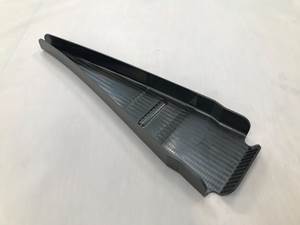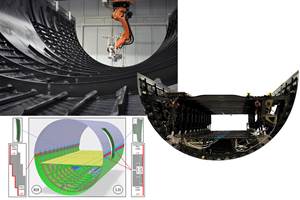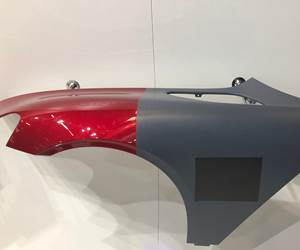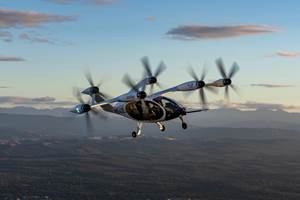Airbus half-year 2024 results highlight increased deliveries, revenue and challenges
The company is focusing on commercial aircraft deliveries and preparing for ramp-ups while addressing supply chain challenges and charges in space business.
H1 2024 financial performance. Source (All Images) | Airbus H1 2024 presentation, p. 9 and p. 19, respectively
Airbus SE (Amsterdam, Netherlands) reported consolidated financial results for the first half of this year (H1), which ended June 30, 2024. “The half-year financial performance mainly reflects significant charges in our space business. We are addressing the root causes of these issues,” says Guillaume Faury, Airbus CEO. “In commercial aircraft, we are focused on deliveries and preparing the next steps of the ramp-up, while addressing specific supply chain challenges and protecting the sourcing of key work packages.”
Gross commercial aircraft orders totaled 327 (H1 2023: 1,080 aircraft) with net orders of 310 aircraft after cancelations (H1 2023: 1,044 aircraft). Order backlog amounted to 8,585 commercial aircraft at the end of June 2024. Airbus Helicopters registered 233 net orders (H1 2023: 131 units), including 38 H225s for the German Federal Police in the second quarter. Airbus Defence and Space’s order intake by value was €6.1 billion (H1 2023: €6.0 billion).
Consolidated revenues increased 4% year-on-year to €28.8 billion (H1 2023: €27.7 billion), mainly reflecting the number of commercial aircraft deliveries and a higher volume in the Air Power business of Airbus Defence and Space. A total of 323 commercial aircraft were delivered (H1 2023: 316 aircraft), comprising 28 A220s, 261 A320 Family, 13 A330s and 21 A350s. Revenues generated by Airbus’ commercial aircraft activities increased 4%, mainly reflecting the higher number of deliveries. Airbus Helicopters’ deliveries totaled 124 units (H1 2023: 145 units) with revenues broadly stable year-on-year, reflecting a solid performance, notably in services. Revenues at Airbus Defence and Space increased 7%, mainly driven by the Air Power business, partly offset by the recent update of Estimates at Completion assumptions in Space Systems. Four A400M military airlifters were delivered in H1 2024 (H1 2023: 3 aircraft).
Airbus also reported on consolidated EBIT Adjusted — an alternative performance measure and key indicator capturing the underlying business margin by excluding material charges or profits caused by movements in provisions related to programs, restructuring or foreign exchange impacts as well as capital gains/losses from the disposal and acquisition of businesses. EBIT Adjusted was €1,391 million (H1 2023: €2,618 million). This decrease primarily reflects €989 million charges recorded in the Space Systems business. EBIT Adjusted related to Airbus’ commercial aircraft activities decreased to €1,954 million (H1 2023: €2,256 million), with the increase in deliveries reduced by investments for preparing the future.
A220 ramp-up continues toward a monthly production rate of 14 aircraft in 2026, with a focus on the program’s industrial maturity and financial performance. In addition, on June 24, in line with agreements in place and as planned, the company and Investissement Québec agreed to provide shareholder financing for the Airbus Canada Ltd. Partnership. As announced in June 2024, the A320 Family ramp-up trajectory has been adjusted to reflect specific supply chain challenges. The production rate of 75 A320 Family aircraft per month is now expected in 2027. The A321XLR, powered by CFM engines, received its type certification from the European Union Aviation Safety Agency (EASA) earlier in July. Entry into service is expected at the end of the summer 2024. On widebody aircraft, the company continues to target a monthly production rate of four A330s in 2024 and rate 12 for the A350 in 2028.
Airbus Helicopters’ EBIT Adjusted decreased to €230 million (H1 2023: €274 million), reflecting lower deliveries and program mix.
EBIT Adjusted at Airbus Defence and Space totaled €-807 million (H1 2023: €78 million), reflecting the €989 million of charges mainly linked to the updated Estimates at Completion in Space Systems. On the A400M program, development activities continue toward achieving the revised capability roadmap. Retrofit activities are progressing in close alignment with the customer. No net material impact was recognized in the first half of 2024. Risks remain on the qualification of technical capabilities and associated costs, on aircraft operational reliability, on cost reductions and on securing overall volume as per the revised baseline.
Consolidated self-financed R&D expenses totaled €1,593 million (H1 2023: €1,431 million). Consolidated EBIT (reported) amounted to €1,456 million (H1 2023: €1,887 million), including net Adjustments of €+65 million.
These Adjustments comprised:
- €+19 million related to the dollar working capital mismatch and balance sheet revaluation, of which €+32 million were in Q2. This mainly reflects the phasing impact arising from the difference between transaction date and delivery date;
- €+51 million related to the gain on Airbus OneWeb Satellites, linked to the acquisition of the remaining 50% of the joint venture in Q1;
- €-5 million of other costs including compliance costs, of which €+1 million were in Q2.
The financial result was €-108 million (H1 2023: €102 million), mainly reflecting the negative impact from the revaluation of certain equity investments. Consolidated net income was €825 million (H1 2023: €1,526 million) with consolidated reported earnings per share of €1.04 (H1 2023: €1.94).
Consolidated free cash flow before customer financing was €-529 million (H1 2023: €1,635 million), mainly driven by the change in working capital which includes the planned inventory build-up to support the ramp-up plan. Consolidated free cash flow was €-559 million (H1 2023: €1,593 million). The gross cash position stood at €21.9 billion at the end of June 2024 (year-end 2023: €25.3 billion), with a consolidated net cash position of €7.9 billion (year-end 2023: €10.7 billion) after the payments of the 2023 dividend and special dividend.
As the basis for its 2024 guidance, Airbus assumes no additional disruptions to the world economy, air traffic, the supply chain, the company’s internal operations and its ability to deliver products and services.
Its 2024 guidance is before M&A. On that basis, the company targets to achieve:
- Around 770 commercial aircraft deliveries;
- EBIT Adjusted of around € 5.5 billion;
- Free cash flow before customer financing of around € 3.5 billion.
Related Content
ASCEND program update: Designing next-gen, high-rate auto and aerospace composites
GKN Aerospace, McLaren Automotive and U.K.-based partners share goals and progress aiming at high-rate, Industry 4.0-enabled, sustainable materials and processes.
Read MoreManufacturing the MFFD thermoplastic composite fuselage
Demonstrator’s upper, lower shells and assembly prove materials and new processes for lighter, cheaper and more sustainable high-rate future aircraft.
Read MoreThe state of recycled carbon fiber
As the need for carbon fiber rises, can recycling fill the gap?
Read MorePlant tour: Joby Aviation, Marina, Calif., U.S.
As the advanced air mobility market begins to take shape, market leader Joby Aviation works to industrialize composites manufacturing for its first-generation, composites-intensive, all-electric air taxi.
Read MoreRead Next
Farnborough Airshow 2024 brings together aerospace innovation, collaboration
The week-long international airshow provided a hub for new announcements made by Boom Supersonic, Airbus, Boeing, GKN, GE, ZeroAvia, Eve, Bell, VoltAero, Eve and Lilium. CW has compiled several below.
Read MoreAirbus A321XLR receives EASA type certification
Single-aisle equipped with CFM LEAP-1A engines is meant to bring long-range flight opportunities to customers. Entry into service starts at the end of summer 2024.
Read More“Structured air” TPS safeguards composite structures
Powered by an 85% air/15% pure polyimide aerogel, Blueshift’s novel material system protects structures during transient thermal events from -200°C to beyond 2400°C for rockets, battery boxes and more.
Read More

















.jpg;maxWidth=300;quality=90)










